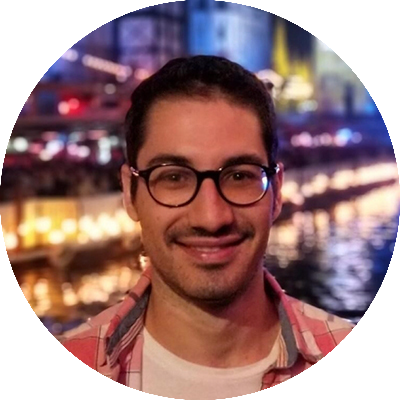
Alberto Marin Gonzalez
Double-strand DNA breaks are among the most toxic lesions that happen in our genomes. These lesions can cause irreversible genome modifications that have been linked with diseases such as cancer and neurodegenerative disorders as well as aging. To prevent this, our cells have developed sophisticated mechanisms to repair double-strand breaks. In Taekjip Ha’s lab, we developed a method to controllably induce double-strand breaks in human cells in high throughput. This method, which uses multitarget CRISPR (clustered regularly interspaced short palindromic repeats), enabled me to trace DNA repair processes with high temporal resolution over multiple genomic locations. In particular, I have shown how chromatin actively participates in the repair process at different length scales. In the immediate vicinity of the lesion, nucleosomes are quickly and transiently evicted, whereas at longer (megabase pair) scales, the genome undergoes extensive 3D reorganization and folds around the lesion. These findings could potentially guide the discovery of new drugs that target DNA repair pathways in diverse diseases.
Questions & Answers
Why did you choose Johns Hopkins for your work?
In 2019, I visited Taekjip Ha’s lab as a short-term exchange graduate student from Madrid. I was impressed by the high quality of research being done in the lab, the department, and the university in general. Also, I found the environment extremely friendly and collaborative. As a result, once I completed my Ph.D., I decided to return to Hopkins and join Taekjip Ha’s lab as a postdoctoral researcher.
What does receiving this award mean to you personally and professionally? Do you have any connection with the particular award you received?
I feel extremely grateful to receive the Paul Ehrlich Award. Professionally, this award feels like an important steppingstone toward my goal of leading a lab doing cutting-edge science. And from a personal perspective, I am very honored to be selected as a Young Investigators’ Day awardee. I have met awardees from previous years whom I deeply admire.
What contributed to your project’s success?
My mentor, Taekjip Ha, gave me the freedom to explore the topic I found most interesting and the support to take a new direction that no one in the lab was pursuing. My colleague, Roger Zou, was also critical to the project’s success — he provided me with the training I needed to perform sequencing experiments, and openly shared his discoveries and tools with me.
What thoughts do you have about Young Investigators’ Day itself, as a celebration of the roles student and fellows play in research at Johns Hopkins?
I think it is an excellent initiative to acknowledge the students and fellows here at Hopkins.
What has been your best/most memorable experience while at Johns Hopkins?
I met my wife here at Hopkins in 2019 and will always feel grateful to the university for that. Incidentally, she is also a Young Investigators’ Day awardee this year.
What are your plans over the next year or so?
I will move to Harvard Medical School this coming summer to further my postdoctoral training in Taekjip Ha’s lab, and I hope to continue finding excellent collaborators with whom to conduct exciting cutting-edge science.
Tell me something interesting about yourself that makes you unique. Do you have any special hobbies, interests or life experiences?
I love traveling around the U.S. — I recently traveled to New Orleans, Denver and Shenandoah National Park. I hope to get to know even more cities and national parks in the near future. I love reading history books and spending time with my friends. I am also an avid chess player.